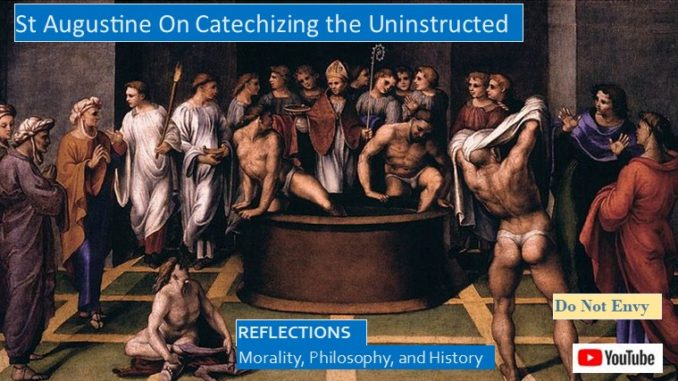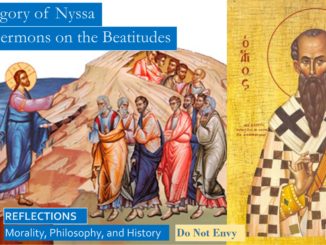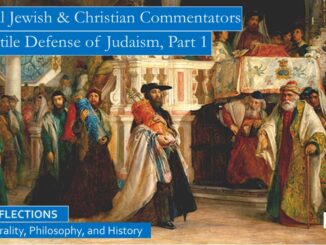
A fellow deacon asked his bishop, St Augustine, for advice on how to conduct an effective catechetical class to prepare his new converts for baptism and admission into the church. St Augustine responded with a discourse titled today as “Catechizing the Uninstructed.” This discourse is an epistle meant to be read aloud to the deacon, and is an excellent glimpse into the soul of the ancient Church, and provides fresh insights into Christianity and Christology to the modern church as well.
The sections of Catechizing the Uninstructed are:
- The core teachings of the Christian faith and life that need to be explained to the catechumens.
- How his deacon can be an effective instructor, how to nurture the faith of both the uneducated and the intellectual catechumen, and how he can overcome the weariness or burnout ministers sometimes feel.
- A long suggested discourse that his deacon can deliver to his catechumens to prepare them to live their lives as true Christians.
- Advice on how to counsel potential converts and catechumens.
- A shorter suggested talk on the Christian faith that his deacon can adapt in his discussions with potential converts.
YouTube script for this blog: https://youtu.be/5Ys5lAhADg8
CORE TEACHINGS OF THE CHRISTIAN FAITH
In all his writings St Augustine reminds us that the core of our faith is the commands to Love God with all of our heart and with all of our soul and with all of our mind and with all of our strength, and to love our neighbor as ourselves. In this work on catechesis St Augustine teaches that the vice that ruins love, the vice that is the enemy of love is envy, and that the mother of envy is pride. This section is referenced in the Catholic Catechism teaching on the Commandment, Do Not Covet.
The best electronic version of Nicene and Post-Nicene Fathers, Series 1, Volume 3, containing this work, is at: https://www.christianbook.com
Unfortunately, the wording of this section is imperfect, and while the translation of this section in the Compendium to the Catechism[1] is much better than the Ante-Nicene translation, it too is not perfect prose. We can only imagine how St Augustine was in a rush to dictate this long response to his bishop. Was the wording of the original dictation by St Augustine convoluted? Did the secretary not transcribe all of St Augustine’s diction? Did the copyists make mistakes copying over the centuries? Were the translators hampered by an incomplete understanding of centuries old Latin phrase? Who knows? Sometimes we do the best we can when we try to understand the meaning of these ancient texts.
God showed his Love for us by sending His Son. “For God so loved the world that he gave his only Son, so that everyone who believes in him may not perish but may have eternal life.”[2] We should “love one another and lay down our life for the brethren, even as Christ laid down His life for us.” It may be a chore to love a God up there in the heavens somewhere, but for Christians it is a joy to Love a God who lived among us as one of us.
St Augustine reminds us that Christ came so “man will learn how much God Loves him,” so man will be kindled to Love God who first Loved him, so we will love our neighbor as we Love Christ, who has become our neighbor by living among us. This Love of God for us commands us to Love God and to love our neighbor as ourselves, on this hangs the law and the prophets, and all other Scriptures. Just as in the “Old Testament there is a veiling of the New, so the New Testament is an unveiling of the Old.”
St Augustine teaches us “that nothing is more opposed to love than envy, and the mother of envy is pride.” The remedy for the pride that leads us to love-destroying envy is our Lord Jesus Christ, who as both God and man is “both a manifestation of divine Love towards us and an example of human humility living with us,” a great misery of proud men cured by a greater mercy, a humble God!
What is common to all converts? Everyone who wishes to be a Christian has “been smitten with some sort of Fear of God.” Some converts may come with a false heart, saying this or that, but “the very untruth that he utters should be point from which we start” his journey down the path of faith. Rather than confront his imperfections we should praise the person he wants to become, so the budding catechumen “will feel it a pleasure to become the kind of man that he actually wants to be,” “reproving him with more than usual kindness and gentleness” to come to a truer understanding of Christian charity and faith.
St Augustine has much advice for the catechumen and his instructor. He counsels that the catechumen seek inspiration primarily from Scriptures, and not seek personal revelations and dreams. He also cautions that when the catechumen begins to “progress in moral qualities and knowledge, and enters into the way of Christ with ardor, that he will not be so bold to credit his progress either to the instructor or himself,” but that he should love all for the sake of the God who Loved him.
We won’t go over all his advice to combat the weariness in both the minister and the catechumen. St Augustine observes that the minister who tires of answering the same questions from the ignorant believer time and time again, should be instead be cheerful in his duties, “for God loves a cheerful giver.” He should remember the patience of Jesus when answered the simple human questions, responding in parables that even the simplest believer could understand. If Jesus, God Incarnate, whose infinite knowledge and faith was far greater than the knowledge and faith of any minister, could always be joyful and patient when teaching his disciples and followers, we need to realize how much simpler it is for us to show patience and joy when speaking to the simple believer.[3]
Next St Augustine includes a suggested discourse to the catechumens, and a suggested discourse to potential converts, which we will discuss in the next blog:
http://www.seekingvirtueandwisdom.com/st-augustine-on-catechizing-the-uninstructed-blog-2/
[1] St Augustine, “On the Catechizing of the Uninstructed, De catechizanddis rudibus 4,8, in Compendium to the Catechism of the Catholic Church (San Francisco: Ignatius Press, 1994, 2002), CCC 2539, p. 85.
[2] https://www.biblegateway.com/passage/?search=john+3%3A16&version=NRSVCE
[3] St Augustine, “On the Catechizing of the Uninstructed,” In the Nicene and Post-Nicene Fathers, Series 1, Volume 3, translated by Rev SDF Salmond (Boston: Hendrickson Publishers, 1994, first published 1887), p. 283-299.




2 Trackbacks / Pingbacks